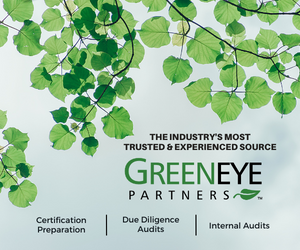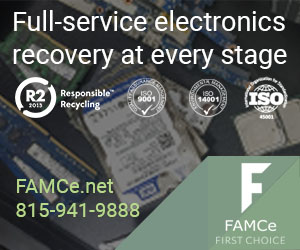
The president of nationwide electronics recycling company URT shares lessons he’s learned about doing business honestly in the e-scrap world. | weedezign/Shutterstock
During my decade of working in e-waste, I have learned more than in college and my prior 16 years in manufacturing combined.
I came into this industry believing that someone who took payment to process a CRT tube or recycle a computer actually did what they said they were going to do. If material was claimed to be collected in a specific state, the material was actually collected in said state. If a downstream vendor was claimed on audit paperwork, the material must truly be processed at that site.

Ken Thomas
Like I said, I have been educated.
My first position at Universal Recycling Technologies (URT) was vice president of finance, beginning in 2012. I was blessed to enter the company under the tutelage of the founder and president, Jim Cornwell. His no-compromise approach of “do the right thing no matter what” has left an indelible mark on me.
I spent the first three years getting my arms around the financials and operating costs for the company. Project No. 1 was to understand the costs and options for CRT glass. The following years, 2012 to 2014, were a massive learning experience. Once completed, a price model was developed to take to market. The goal of business, after all, is to make a reasonable return on investment with enough left over to continue to invest in the business.
Needless to say, I was shocked at the feedback I received from the sales team about the model. How is it possible that URT could have such a strong reputation in the market for doing the right thing, but be so overpriced relative to most of the competition?
The first hint I got came from Materials Processing Corporation (MPC) in Minnesota. After that CRT stockpile fiasco, I understood why we were not competitively priced in that state. I still remember the discussions about matching prices with Global Environmental Services (GES) if we wanted to stay in business. “Nope!”
The next company to show up on my radar was 5R. Six months after losing substantial business to 5R due to its low pricing, the company was out of business. After they left millions of pounds of CRT waste behind, the states of Tennessee and Wisconsin were tasked with cleaning up their mess.
While attending my first E-Scrap Conference, I saw a presentation by Nulife showing an empty building. It boasted, “This is where the new furnace is going, send us your glass!” URT was actually questioned as to why we were unwilling to do so. Additionally, the pressure to use Closed Loop Refining and Recovery as a downstream – as opposed to processing our own glass – was immense. I wondered how their price could be substantially less than our costs.
Next was a downstream who would take all of our untested flat-panel displays (FPDs) at an incredible price. Passing a portion of the cost savings to the market would have doubled our volume. We were told not to worry about how they processed the FPDs. Additionally, the company told URT that the flat-panel displays were being repurposed. There were too many red flags on display here to continue honest business conversations. After all this, GPS tracking data started hitting the market. While this particular processor faded away, the GPS maps for the final destination of non-functioning FPDs justified our stance.
The number of times URT is claimed as “the downstream” by a recycler who ships a single load a year is astounding. While having a strong reputation in the market is great, being used as cover for bad practices is frustrating. Claiming a reputable processor as a downstream destination for certification, state programs and OEMs but sending the bulk of the material elsewhere is fraud, plain and simple.
To anyone in the industry, it is obvious that I am only scratching the surface on the charlatans and con artists that have plagued our industry. Many have been forced to close shop, pay fines and serve time in prison. Unfortunately, this is a game of whack-a-mole, and none of this information is actually a secret to the industry.
Core principles
I’ve learned some important lessons in my past decade in this business. Here are some big ones that can help guide businesses in the sector maintain their standing over the long term:
Reputation matters: Being honest with customers is imperative. Serving the needs of a customer is an obvious requirement. Having said that, say what you can do, then do what you say – consistently. Operating according to the mantra of “say whatever they want to hear” is a dangerous way to run a business.
Know the economics: If the pricing is too good to be true, the material is probably sitting in a warehouse or in a hole – or it has been illegally shipped overseas.
Integrity counts: Understand who you engage with for business dealings. A big flashy banner at a trade show bragging about future plans is as substantial as the last wisp of smoke from a doused campfire. If properly processing material costs more, say so. Be honest with yourself and your customer.
Vetting: Do the hard audit work. Look at mass balance instead of a six-month-old bill of lading. Visit the facility during operating hours. Review operational documents, maintenance records, and employee numbers, etc. Ponder the process their sales team describes and evaluate it compared to what their operations can actually support. Investigate third-party-audited financial statements. Evaluate pricing and determine whether the company is investing in innovation. Be wary of multiple warehouses and a parking lot full of trailers. These are red flags.
Continue to invest: As I stated earlier, I was blessed to be brought into the industry under Jim Cornwell, an owner committed to the URT vision of safe and responsible recycling. A laser-focus on employee development, production improvement and recycling innovation is what will bring our industry to an elevated status on the world stage.
Ken Thomas is president of Universal Recycling Technologies (URT).
The views and opinions expressed are those of the author and do not imply endorsement by Resource Recycling, Inc. If you have a subject you wish to cover in an op-ed, please send a short proposal to [email protected] for consideration.



